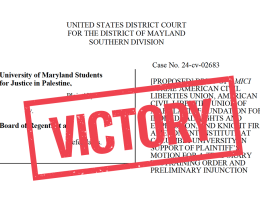
The ACLU of Maryland is a non-partisan organization that exists to empower Marylanders to exercise their rights so that the law values and uplifts their humanity. In the legislature, we advocate for a broad range of rights – including access to justice, legal justice reform, election fairness and voting rights, freedom of expression, government transparency, police accountability, rights of people who are incarcerated, public school students' right to education, equal protection, privacy, racial justice, due process, religious liberty, and LGBTQ+ and reproductive rights.
- Download ACLU-MD's 2023 priorities overview.
- Read the blog, "Your Guide to the 2023 Maryland General Assembly Session."
- Learn more about what happened during the legislative session in our 2022 report.
The items below represent some of the issues we expect to dedicate significant time and resources to during the 2023 legislative session.
Ensure Independent Investigatory Powers for Police Accountability Boards
The Maryland Police Accountability Act of 2021 directed all counties and Baltimore City to establish a Police Accountability Board (PAB) and Administrative Charging Committee (ACC). Despite strong community support, research, and best practices indicating that independent investigatory powers are critical functions of a community oversight board, no PABs in Maryland currently have this authority. This result is primarily due to improper claims made by the Fraternal Order of Police about the authority local governing bodies must give these boards independent investigatory powers. In 2023, the ACLU and the Maryland Coalition for Justice and Police Accountability will work to pass a bill to clarify that local governing bodies have the power to empower their PABs to issue subpoenas, interview witnesses, and employ all other investigative techniques necessary to draw accurate conclusions about incidents, and to investigate claims prior to ACC adjudication and after.
FACT SHEET – POLICE Accountability
Hoja de información – Responsabilidad Policial de Maryland
Eliminate Criminal Penalties for Marijuana
This past November, Maryland voters overwhelmingly approved to end the criminalization of recreational use of marijuana. However, under the new law, marijuana related offenses such as possession with intent to distribute and possession of more than the civil use amount, can still result in a misdemeanor conviction. Without eliminating these penalties, Black people will be vulnerable to existing arrest patterns, where Black people will be saddled with criminal penalties despite legalization. Legalization should not only address past harms, but it must prevent future disparities. In 2023, the ACLU and allies will work to pass a bill that eliminates these penalties and designates possession of more than the civil use amount and possession with intent to distribute as civil offenses, subject to citations and civil fines, rather than imprisonment.
fact sheet – marijuana Criminal Penalties
Ban Marijuana Odor Stops and Searches
The current standards around marijuana odor searches and stops were made under decriminalization. Now, the legislature must adjust the state law to align with the recently passed legalization referendum. Police have long been granted the authority to conduct searches based on something that cannot be categorically proven: a claim based solely on their sense of smell. These claims have been routinely used to infringe on individuals’ right to privacy and justify racial profiling. In 2023, the ACLU and the Maryland Coalition for Justice and Police Accountability will work with allies to pass a bill to ensure that police cannot use the odor of marijuana to stop an individual or perform a warrantless search of a vehicle.
fact sheet – marijuana oDOR STOPS & SEARCHES
Marijuana Odor Stop & Search Interview - Ron Williams
Marijuana Odor Bill Press Conference Highlights - March 9, 2023
Remove the Governor from Medical Parole
In 2021, the General Assembly successfully removed the Governor from the parole process, eliminating the politicized process of allowing governors to overturn parole decisions for Marylanders serving life imprisonment sentences. But there was a drafting error that excluded medical parole, making it the only type of parole to still require gubernatorial approval. This is serious, because it is arguably most critical for the Parole Commission to be able to act expeditiously where the parole candidate is seriously ill or dying. In 2023, the ACLU will work with allies to support a technical fix bill.
Pass a Voting Rights Act in Maryland
Although Maryland has made significant strides to improve access to voting over time, many voting rights abuses and discriminatory structures persist. Legal tools and resources to investigate and prosecute them have been unavailable or too costly. This is in part because judicial decisions over the last 30 years have chipped away at protections under the federal Voting Rights Act. In 2023, the ACLU will work with allies to introduce a Maryland Voting Rights Act. Building on models enacted recently in New York and California, a Maryland Voting Rights Act will enable our state to confront evolving barriers to participation and to root out longstanding discriminatory practices by creating a civil right of action against voter intimidation and protections for non-English-speaking voters. It will also provide resources to local governments considering changes to election structures and rules and encourage a streamlined and low-cost approach to addressing complaints of voting discrimination.
fact sheet – maryland Voting Rights Act
Ensure Adequate and Equitable Education Funding for Maryland Public School Children
Maryland children have the right to a "thorough and efficient” public education, as guaranteed by the state constitution. This right includes funding so that all students have the full range of academic programs, supports, and resources they need to succeed. After decades of underfunding, the legislature passed the Blueprint for Maryland's Future (aka "Kirwan"), which is projected to increase funding for public schools, phased in over a decade. In 2023, the ACLU will work with partners to ensure that the full increase in funding required by law is passed in the FY24 budget. The ACLU will also advocate to maintain the current high levels of school construction funding in the state capital budget, as school districts statewide continue to rebuild deteriorating school facilities and address large backlogs in building maintenance.
Hoja de información – Derecho a la educación









